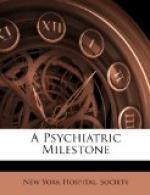If one wished to establish a scientific distinction between neuroses and psychoses, I should say, in a summary fashion, that in neuroses the reflection alone is disturbed, that in psychoses the immediate assent itself is affected. The shrinkage of the conscience, doubts, aboulias, obsessions, scruples are always disorders of the reflected will and belief. On the contrary, irresistible impulsions, deliriums, indifferences which suppress desires and only allow elementary agitations to subsist, show alterations in the immediate assent, in the will, and the primitive belief and must be considered as psychoses. Below could be placed the disorders of elementary intelligence, the disorder of the perceptive and social functions which characterize the mental deficiencies of imbeciles and idiots. One might also distinguish these disorders according to the degree of depth the destruction of the edifice has reached, according to the more or less distant state of evolution to which the patient goes back. But these psychological classifications are purely theoretical, and in practice many other factors intervene which oblige us to consider such a patient as incapable of doing any harm and such another as dangerous; this is the only difference to-day between neuroses and psychoses. Later on, without doubt, we shall be able to substitute for these simply symptomatical and psychological diagnostics, some etiological and physiological diagnostics. We shall be able from the very outset to recognize that a disorder, in all appearance slight and which is not deeply set, presents a bad prognosis, and we shall be able to foresee a serious and deep psychosis in the future. To-day, without doubt, one can often distinguish from the outset the future general paralytic from the simple neurasthenic. But in the actual state of science this ability to distinguish is not frequent and the future evolution of a depressed state can scarcely be foreseen with precision.
Certain individuals pass in a few years from psychasthenic depression with doubts and obsessions to psychasthenic deliriums with stubbornness and negativism, then to asthenic insanity with irremediable and complete want of power. Is it necessary to say that we made a mistake in our diagnostic and that from the first demential psychosis should have been recognized? I am not convinced of this: these diseases, excepting a few cases with rapid evolution, are not characterized from the outset. Without doubt we must note that these depressions which disturb the reflective tendencies of young patients in full period of formation, are dangerous and can bring on still deeper depressions of the psychological tension. But that evolution is rarely fatal; it can very often be checked, and it seems to me fair to preserve the distinction between neuroses and psychoses considered as different degrees of psychological decadence.




